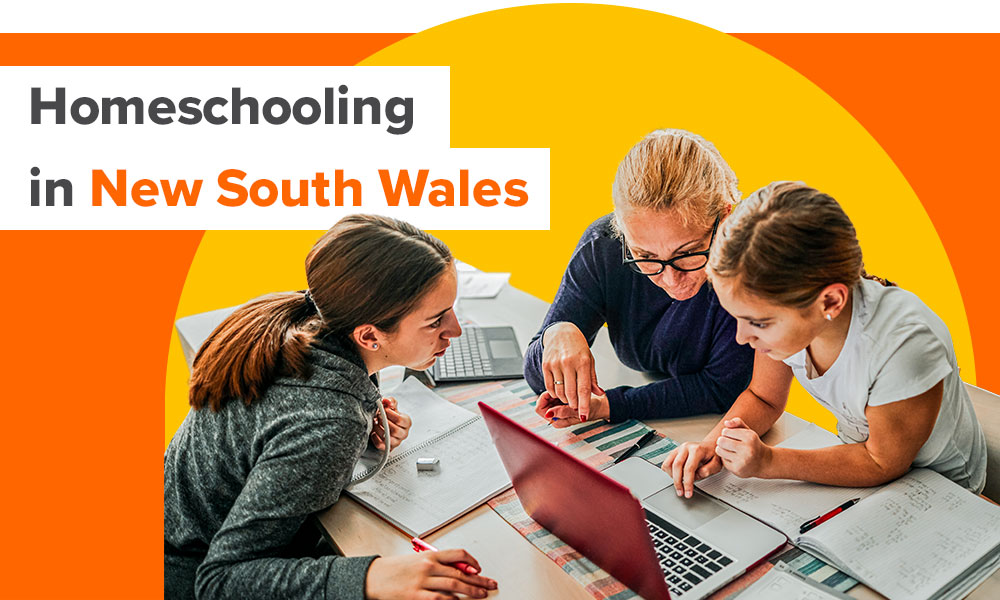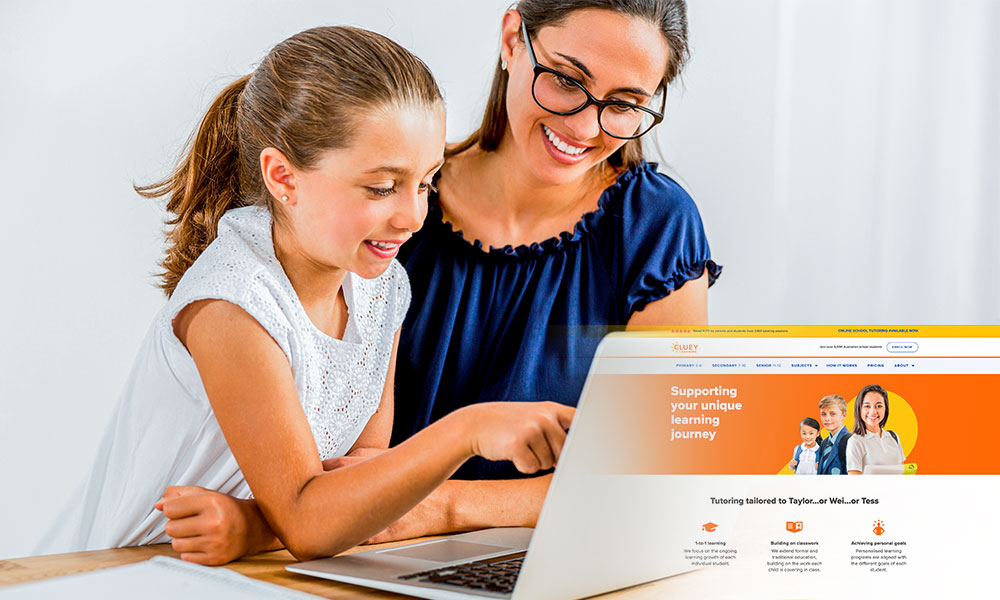Under the Education Act 1990, you can choose to educate your child at home during any stage of their schooling (K-12). However, every single homeschooled child must be registered with the NSW Education Standards Authority (NESA). You will also be required to renew your registration at the end of your 3, 6, 12 or 24 month approved period.
According to NESA, less than two percent of homeschooling applications were refused in 2018, bringing the total number of homeschooling students to 5,429.

Registering for homeschooling in NSW
You must complete a registration form with key information about your child, including their age and year level, special needs and reasons for homeschooling. You will also be required to submit the following documents as part of your application:
- Records of your child’s educational history and previous attainment
- An educational program based on the NSW syllabus
- A plan or method for recording learning activities
- A plan or method for recording achievement and progress.
Following this application, an authorised NESA representative will be in contact to go over your relevant documentation and organise a home visit to assess your eligibility based on sufficient resources and a suitable learning environment.
Further guidance on the assessment process, and the way authorised persons might approach your application can be found here
For more details on the specific process and requirements of homeschooling, you can view NESA’s guidelines for homeschooling registration in NSW.
When you have all of your documents ready, you can download the NESA homeschooling registration form.
Requirements of homeschooling
According to NESA, the following must be met in order to satisfy the requirements of homeschooling:
- Your child’s educational program is based on the curriculum provided by the Act i.e. the minimum curriculum for primary education (Kindergarten to Year 6), secondary education (Years 7 to 10) or senior secondary education (Years 11 and 12).
- Your educational program is based on and taught in accordance with the relevant NESA syllabuses.
- Your educational program caters to the identified learning needs of your child.
- There is an adequate system for planning, supervising and recording teaching and learning experiences.
- There is an adequate system for recording your child’s progress and achievement.
- The time allocated to learning is sufficient to cover the curriculum.
- Your home learning environment is suitable for effective homeschooling.
- The identified resources are adequate to support your child’s learning.
Records of implementing your child’s educational program must be kept to show how the program has been delivered and how the requirements for registration are being met.
How Cluey supports homeschooling in New South Wales
Our flexible, online model means that your child can log in to our online learning platform from anywhere, utilising video, audio and collaborative whiteboard capabilities.
You can choose the areas you’d most like to focus on and specify your learning goals. Our programs can be tailored to your teaching philosophy and the needs of your child. What’s more, you’ll receive a report at the end of every session which can form part of your portfolio of learning progress.
Learn more about homeschooling support with Cluey >>
FAQs
What do I need to consider before I homeschool?
Although there are some technical details to consider, homeschooling is first and foremost an incredible time commitment. It’s important to consider whether you have the time and energy required to teach your child, and whether this will get in the way of paid work or other commitments.
How old must my child be before I register them?
Children are eligible to begin kindergarten (or register for homeschooling) if they turn five on or before July 31 of that year. They must be enrolled or registered for homeschooling by their sixth birthday.
What happens after I register?
Once you submit a written application along with the required documents (see above), an authorised NESA representative will contact you to go over your details and organise a home visit to assess your eligibility prior to approval.
How long will the application process take?
Although every approval process is different depending on your individual circumstances, an average approval process from the time you submit your application is between one and three months.
What happens when an inspector makes a home visit?
An authorised NESA representative will probably get in touch within two weeks of receiving your application and will likely want to schedule an appointment shortly thereafter. Be prepared to discuss your reasons for homeschooling and demonstrate a sound understanding of the NSW syllabus outcomes, as well as your homeschooling content plan.
This is an informal discussion in which your NESA rep will ensure you have a healthy learning environment and sound homeschooling plan.
What is an inspector/authorised person’s role?
An inspector/authorised person represents NESA in determining whether you’re eligible to homeschool your child. They’ll inspect your home (not every corner) to ensure you have sufficient resources and a suitable learning environment. They’ll talk to you about your teaching philosophy and learning plan to make certain that you understand the realities of homeschooling and that the arrangement will ultimately benefit your child.
The role of this person isn’t to judge or interrogate you, although they do ultimately have to make a recommendation to NESA’. Their role is to ensure you have everything you need, and that you’re mentally prepared for homeschooling. They might also recommend resources for you, including homeschooling support groups.
What happens if my application for homeschooling registration is refused?
If your application is refused, you’ll be notified in writing and given a clear reason for refusal. You may seek an internal review of the authorised person’s recommendation within 30 days of the notice date.
If an internal review is requested, your original authorised person is replaced with a different individual who will conduct the assessment. You’ll be given the opportunity to submit further material in support of your application and arrange another home visit. This process typically takes around four weeks to complete.
What happens if they refuse my application for registration after an internal review?
If the authorised person conducting the internal review confirms the original recommendation that registration be refused, NESA will notify you in writing with the reasons for the recommendation. The notice will also advise you of your right to appeal the recommendation to the NSW Civil and Administrative Tribunal (‘NCAT’) within 28 days of the notice.
How can I make sure I get approved?
Do your research on what’s required, including the relevant documentation and a detailed learning plan. You should also be ready to arrange a home meeting with your authorised person within 1-2 weeks of submitting your application.
Most refusals are due to an inability to arrange a home visit, despite making ample attempts to contact the parent. They also occur when the authorised person determines that the requirements are not being met or would not be met.
Will I be monitored by inspectors while homeschooling?
Records of implementing your child’s educational program must be kept to show how the program has been delivered and how the requirements for registration are being met.
For the most part, you’ll be left to implement your child’s curriculum on your own, however a monitoring visit to a homeschooling family may occur if NESA receives information suggesting that your homeschooling requirements are not being met for the period of registration. You’ll be contacted in advance should you require one of these visits.
What are the essential subjects/curriculum I need to teach?
Although there is no set homeschooling curriculum, you’ll be required to develop an educational program based on the NSW curriculum. These include core literacy, numeracy and HSIE subjects. More information about the NSW curriculum for each year group can be found here.
How much time should I spend on each subject?
You might find that a four day week works best, or five half days. You need to ensure you cover the requirements in the NSW curriculum, but the way you teach it and the time you spend on each module is entirely up to you.
What if my child has special needs?
If you have a child who for any reason doesn’t fit the “ordinary” box, homeschooling could be a positive option. Homeschooling can often take the stress out of structured lessons, allowing children to learn at their own pace and in their own way. For special needs, always seek as much support as possible, both to ensure you’re teaching to your child’s unique needs, and to connect with other parents or teachers who might be experiencing similar challenges.
How do I plan my homeschool/learning program?
You could plan your own curriculum based on the learning outcomes detailed in the NSW curriculum. There are also several out-of-the-box homeschooling programs, many of which are developed by education experts and based on different approaches and teaching philosophies.
How do I document my homeschooling progress/portfolio?
There’s no one way to document your homeschooling portfolio. You might put together a collection of work, which would look different depending on the age and ability of your child. A written diary or essay samples are one example. Maths worksheets, stories based on historical understanding and other creative, inquiry-based studies are other options.
Do I need formal teaching qualifications to homeschool?
You don’t need any formal training to become a homeschool teacher. As long as you meet the requirements and show evidence of learning, you’re set!
What do I do if I’m overwhelmed?
Will you be able to cope with the mammoth undertaking that is homeschooling? The short answer is yes — when there’s a will there’s a way. But it’s important to understand the realities of homeschooling and seek support in the form of outside tutoring if you feel yourself burning out.
Does my homeschooled child really need to complete Year 11 or 12?
Like mainstream education, progressing to a senior level is entirely up to you and your child. If your child has university in his or her sights, you might consider senior studies through Open Universities, which offers a Year 12 equivalent certification, or tertiary study options.
How does a homeschooler complete Year 10?
If you child would prefer to finish their studies in Year 10, you may apply for a Certification of Completion of Year 10 via NESA.





